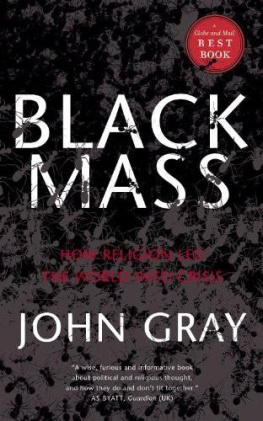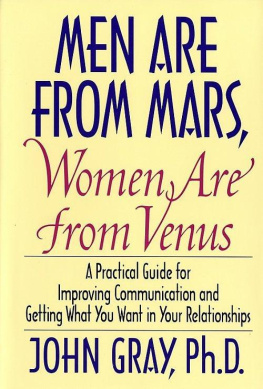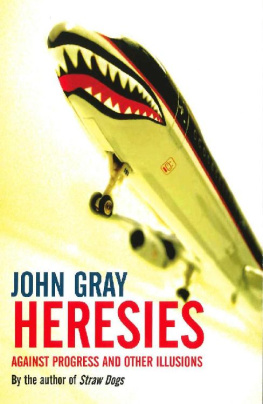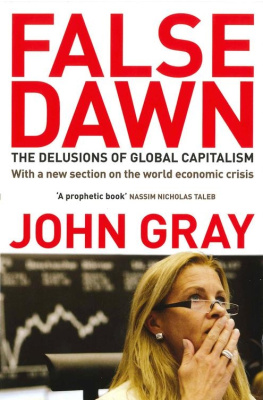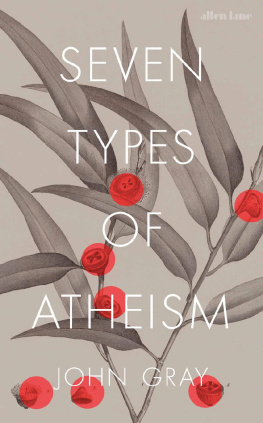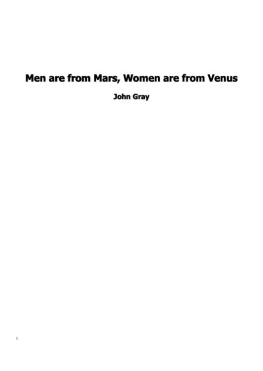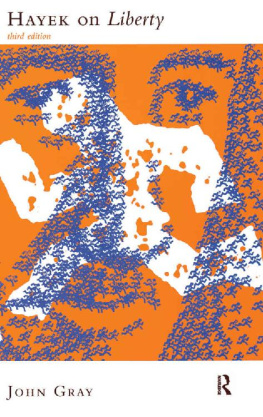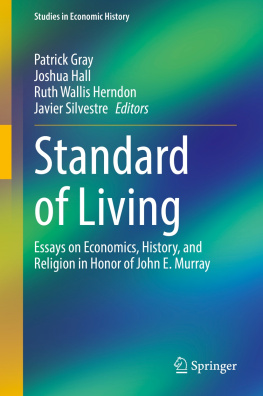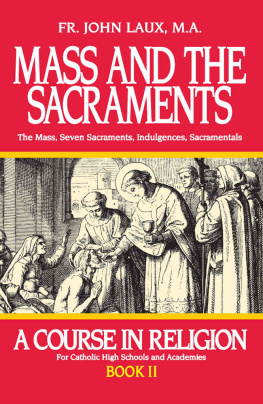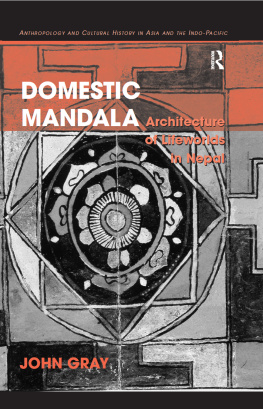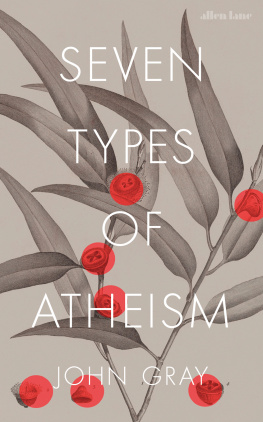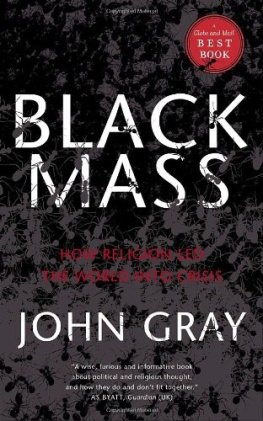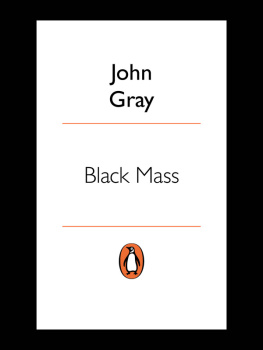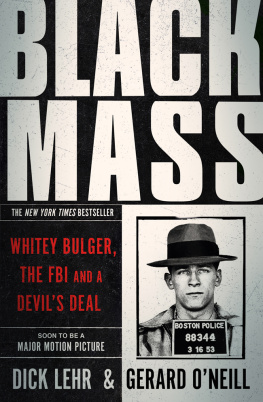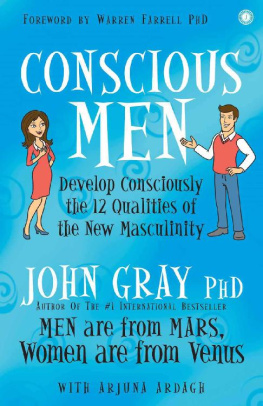John Gray - Black Mass: How Religion Led The World Into Crisis
Here you can read online John Gray - Black Mass: How Religion Led The World Into Crisis full text of the book (entire story) in english for free. Download pdf and epub, get meaning, cover and reviews about this ebook. year: 2008, publisher: Farrar, Straus and Giroux, genre: Religion. Description of the work, (preface) as well as reviews are available. Best literature library LitArk.com created for fans of good reading and offers a wide selection of genres:
Romance novel
Science fiction
Adventure
Detective
Science
History
Home and family
Prose
Art
Politics
Computer
Non-fiction
Religion
Business
Children
Humor
Choose a favorite category and find really read worthwhile books. Enjoy immersion in the world of imagination, feel the emotions of the characters or learn something new for yourself, make an fascinating discovery.
Black Mass: How Religion Led The World Into Crisis: summary, description and annotation
We offer to read an annotation, description, summary or preface (depends on what the author of the book "Black Mass: How Religion Led The World Into Crisis" wrote himself). If you haven't found the necessary information about the book — write in the comments, we will try to find it.
Black Mass: How Religion Led The World Into Crisis — read online for free the complete book (whole text) full work
Below is the text of the book, divided by pages. System saving the place of the last page read, allows you to conveniently read the book "Black Mass: How Religion Led The World Into Crisis" online for free, without having to search again every time where you left off. Put a bookmark, and you can go to the page where you finished reading at any time.
Font size:
Interval:
Bookmark:
Praise for Black Mass
Vintage Gray. Black Mass is a sparkling synthesis of religious history and contemporary political analysis. A passionate and powerful polemic.
The Spectator (UK)
A phenomenal book and a pleasure to read. Gray is a profound thinker, and often delivers his thoughts in clear shards of poetry. Brilliant.
The Halifax Daily News
Penetratingly lucid. Particularly distinguished in the way it addresses how academic and Beltway neo-conservatives like Jeane Kirkpatrick, Francis Fukuyama and Paul Wolfowitz constructed the ideological framework for the war on terror.. The book presents one of the more incisive overviews of the origins and nature of the modern neoconservative movement.
The Gazette (Montreal)
An often rollicking, sometimes bone-crunching history of medieval barbarism, millennial cults, the rise of totalitarianism and the nadir of fascism, ending with a precise account of the lies and self-deceiving hopes that hurried on the invasion of Iraq.
New Statesman
A little Molotov cocktail of a book. Whats impressive is the way [Gray] imbeds present political trends in a larger framework going back to the beginnings of Western culture. The book challenges and provokes. For most readers, I suspect, it will tell them things they didnt know.
Houston Chronicle
[Gray] is a master of intellectual history. He has a sharp eye and a vivid writing style. And best of all, he dissects the pieties of others without regard for party, ideology, faith or faction.
The Ottawa Citizen
BY THE SAME AUTHOR
False Dawn: Delusions of Global Capitalism
Straw Dogs: Thoughts on Humans and Other Animals
Al Qaeda and What it Means to be Modern
Heresies: Against Progress and Other Illusions

THE SENATOR : This is an abyss into which it is better not to look.
THE COUNT : My friend, we are not free not to look.
Joseph de Maistre, St Petersburg Dialogues
Black Mass, df. A sacrilegious ritual in which the Christian Mass is performed backwards.
6
Many people have helped me in writing this book. Norman Cohn gave me the immese benefit of his conversation, and I could not have developed the interpretation of modern politics and religion presented here without it. Conversations with Bryan Appleyard, Robert Colls, Michael Lind, Adam Phillips and Paul Schtze have entered into the book in many ways. Simon Winder, my editor at Penguin, has given me invaluable suggestions and encouragement at every stage of the books development. Tracy Bohan of the Wylie Agency UK in London and Eric Chinski at Farrar Straus Giroux in New York, and Nick Garrison of Doubleday Canada have been enormously helpful in giving me their comments. I am extremely grateful to David Rieff for his penetrating thoughts on a late draft. Responsibility for the book remains mine.
My biggest debt is to Mieko, who made the book possible.
John Gray
The Death of Utopia
Modern politics is a chapter in the history of religion. The greatest of the revolutionary upheavals that have shaped so much of the history of the past two centuries were episodes in the history of faith moments in the long dissolution of Christianity and the rise of modern political religion. The world in which we find ourselves at the start of the new millennium is littered with the debris of utopian projects, which though they were framed in secular terms that denied the truth of religion were in fact vehicles for religious myths.
Communism and Nazism claimed to be based on science in the case of communism the cod-science of historical materialism, in Nazism the farrago of scientific racism. These claims were fraudulent but the use of pseudo-science did not stop with the collapse of totalitarianism that culminated with the dissolution of the USSR in December 1991. It continued in neo-conservative theories that claimed the world is converging on a single type of government and economic system universal democracy, or a global free market. Despite the fact that it was presented in the trappings of social science, this belief that humanity was on the brink of a new era was only the most recent version of apocalyptic beliefs that go back to the most ancient times.
Jesus and his followers believed they lived in an End-Time when the evils of the world were about to pass away. Sickness and death, famine and hunger, war and oppression would all cease to exist after a world-shaking battle in which the forces of evil would be utterly destroyed. Such was the faith that inspired the first Christians, and though the End-Time was re-interpreted by later Christian thinkers as a metaphor for a spiritual change, visions of Apocalypse have haunted western life ever since those early beginnings.
During the Middle Ages, Europe was shaken by mass movements inspired by the belief that history was about to end and a new world be born. These medieval Christians believed that only God could bring about the new world, but faith in the End-Time did not wither away when Christianity began to decline. On the contrary, as Christianity waned the hope of an imminent End-Time became stronger and more militant. Modern revolutionaries such as the French Jacobins and the Russian Bolsheviks detested traditional religion, but their conviction that the crimes and follies of the past could be left behind in an all-encompassing transformation of human life was a secular reincarnation of early Christian beliefs. These modern revolutionaries were radical exponents of Enlightenment thinking, which aimed to replace religion with a scientific view of the world. Yet the radical Enlightenment belief that there can be a sudden break in history, after which the flaws of human society will be for ever abolished, is a by-product of Christianity.
The Enlightenment ideologies of the past centuries were very largely spilt theology. The history of the past century is not a tale of secular advance, as bien-pensants of Right and Left like to think. The Bolshevik and Nazi seizures of power were faith-based upheavals just as much as the Ayatollah Khomeinis theocratic insurrection in Iran. The very idea of revolution as a transforming event in history is owed to religion. Modern revolutionary movements are a continuation of religion by other means.
It is not only revolutionaries who have held to secular versions of religious beliefs. So too have liberal humanists, who see progress as a slow incremental struggle. The belief that the world is about to end and belief in gradual progress may seem to be opposites one looking forward to the destruction of the world, the other to its improvement-but at bottom they are not so different. Whether they stress piecemeal change or revolutionary transformation, theories of progress are not scientific hypotheses. They are myths, which answer the human need for meaning.
Since the French Revolution a succession of utopian movements has transformed political life. Entire societies have been destroyed and the world changed for ever. The alteration envisioned by utopian thinkers has not come about, and for the most part their projects have produced results opposite to those they intended. That has not prevented similar projects being launched again and again right up to the start of the twenty-first century, when the worlds most powerful state launched a campaign to export democracy to the Middle East and throughout the world.
Font size:
Interval:
Bookmark:
Similar books «Black Mass: How Religion Led The World Into Crisis»
Look at similar books to Black Mass: How Religion Led The World Into Crisis. We have selected literature similar in name and meaning in the hope of providing readers with more options to find new, interesting, not yet read works.
Discussion, reviews of the book Black Mass: How Religion Led The World Into Crisis and just readers' own opinions. Leave your comments, write what you think about the work, its meaning or the main characters. Specify what exactly you liked and what you didn't like, and why you think so.

